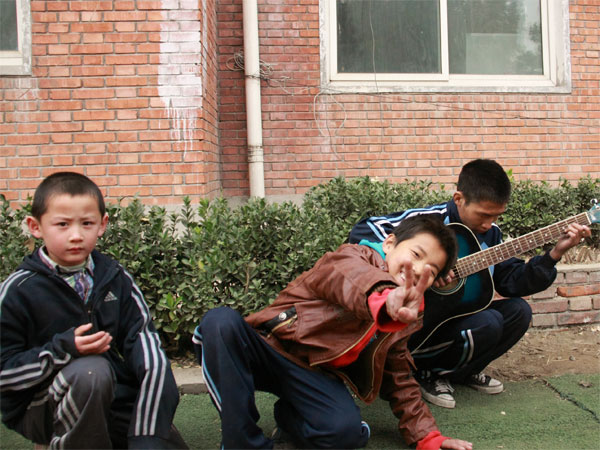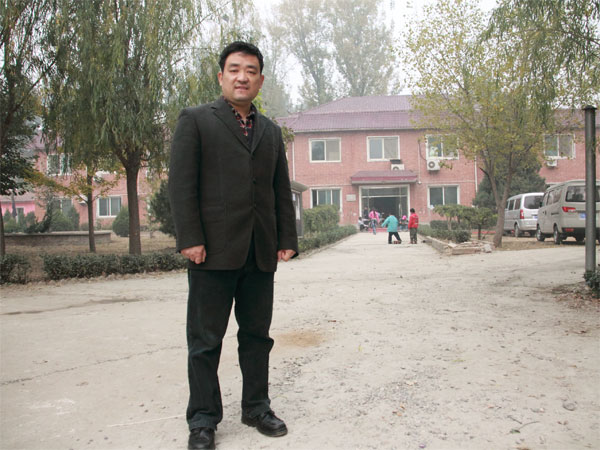Love and light guide Shi's orphan mission
- By Wu Jin
 0 Comment(s)
0 Comment(s) Print
Print E-mail
China.org.cn, November 3, 2011
E-mail
China.org.cn, November 3, 2011
Tucked away at the eastern end of Dajiangwa Village in Beijing's suburban Shunyi District, Light and Love School was established by former Anhui businessman Shi Qinghua to accommodate and educate 108 homeless children.
On a sunny Sunday morning in late autumn, groups of children ran, laughed and chatted among the lines of saplings and bushes in the schoolyard. A blind boy, squatting nearby, played a series of tunes on a guitar, providing a soundtrack to their crisp joy. Sitting inside listening to the joyful sounds, Shi unfolded the bitter events from his past which led, eventually, to the setting up of his acclaimed school.
Fourteen years ago, a neighborhood blast caused by explosive firecrackers destroyed Shi’s comfortable life, leaving his wife and son physically disfigured. In order to get treatment for their scars and burns, Shi took them to Beijing. However, the necessary treatment and surgery proved expensive, and Shi saw his savings disappear. As a result, Shi and his family were forced to live on the streets.
|
|
|
Children play in the schoolyard while a blind boy plays the guitar. [China.org.cn] |
Predictably, life was hard at first. Frightened by the family’s distorted faces, few people were willing to approach them, let alone to respond to their pleas for food and money. Just as the family's situation seemed hopeless, they were approached by a number of homeless children who were also living rough. The children shared their food with Shi and his family and alleviated their loneliness and desperation. From these circumstances, Shi and his family forged a lasting emotional bond with the homeless children.
Several months later, Shi's futures took a turn for the better. A local newspaper published his story and his staunch loyalty to his wife and son won widespread sympathy and support. He finally found work and threw himself into his working life. Then, in 2003, he started his own business. "At that time, I still felt desperate whenever I looked at my handicapped wife and son," Shi said. "So I worked crazily, usually from 5:00 am to 10:00 pm every day, thinking I would rather die of exhaustion than live in grief." Shi could hardly have imaged then that his life was about to change once more, thereby pushing him out of his desperation.
|
|
|
Shi Qinghua, the founder of the Light and Love School, stands on the unpaved road which leads to the building housing his 108 little beneficiaries. Shi will never forget the kindness shown to him by homeless children in Beijing after tragedy struck his family. He is now repaying them with his love and passion. [China.org.cn] |
The change came about one frosty winter night when he brought home several homeless children. “I simply thought my room might shelter them from the blowing wind, because I know how it feels to be freezing on the streets,” Shi recollected. Yet he never thought that his generous offer of temporary accommodation would turn into a long-term cause and turn him into a savior of abandoned children.
"It didn't really occur to me, because the first time I brought children home I was irritated by some of their bad habits, which included smoking and stealing," said Shi. "They were so lacking in discipline that I told them to leave my home. But they wouldn’t leave, because they had no one else to cling to."
However, destiny comes in strange forms. In Shi's case, it came in the form of a group of random, ill-disciplined homeless children. From that first group of children, Shi's adopted brood swelled to over a hundred, and his charitable career was born. He shared his food with them, but food was only part of the equation. “It’s just a matter of one bowl or two bowls for a meal, he said. “People seldom lack food, what they really lack is true love.”
In 2004, Shi established the free boarding school with the support of the China Youth Culture and Arts Foundation. According to Shi, free food and accommodation alone is not a permanent solution for homeless, bullied and abandoned children. "They must receive education, or their wayward ways are likely to lead them to prison," Shi said.
|
|
|
It may be a decade or more before the lines of saplings which stand in the schoolyard tower over the two-storey school building. [China.org.cn] |
In the beginning, Shi was full of conviction, but short of money and help. His lack of money meant that he was only able to give his children cabbage to eat. As a result, the children dubbed him "Cabbage Father". Shi's problems were alleviated when his story generated a stream of press coverage. Following the storm of media attention, many volunteers flocked to the school to offer their help.
The volunteers contributed both teaching time and suggestions to the school. From these suggestions, Shi was inspired to appear in a TV advertisement for the painkiller Fenbid in 2006. He was paid over 500,000 yuan (US$78.697) for the commercial and gave all his earnings to the children. "It guaranteed that the children would have food for at least another two years," said Shi.
Fuelled by the injection of money, attention and volunteers, the school continued to grow and also partnered with international schools. The school now takes a professional approach to education, but raising the spirits of the abandoned children is always a challenge.
Wang Ming, a 12-year-old newcomer, said that he ran away nine times during his four-month stay at the school. Shi always took him back. "I don't know why the headmaster is so good to us - he never had a problem taking me back," said Wang. Wang's father abandoned the family when Wang was one year old, leaving his mother unable to cope. The child's aunt took custody of him with her meager income in a rural town in Hunan Province. Due to the lack of parental care, the boy fled home at the age of 11 and wandered randomly, from Hunan, Xiamen to Hebei. "I think I make the wrong choice, because it wasn’t until I left my home that I understood how cruel society is," Wang told China.org.cn.
During his time spent wandering, Wang was periodically ignored, scorned and cheated. At one point he was even locked in a factory in suburban Hebei Province to work as a child laborer, His days were long and hard, and he worked from 5:00 am to 2:00 am each day. "I was so scared at that time so I dialed '110'," the child recalled. "But the operator said they were unable to help me because I could not tell them the precise location of the factory." According to Wang, he was finally rescued after his family called the local police and borrowed 4,000 yuan to pay the factory owner as reimbursement.
When Wang was sent to Shi's school, he had already undergone so many hardships that he was unable to trust anyone or have any confidence in a future he saw as being full of unpredictability. "After everything that’s happened to me, I am unable to focus on anything. I cannot be as attentive as the rest of my classmates to recite a poem, even a short one," said Wang. "I don't know what the future holds for me."
Shi, though, refuses to give up on the traumatized child. According to him, the boy is one of the cleverest in his school. "He's really talented, and he always sees things through," Shi said. "I hope more good Samaritans can come to help these children, to educate them to be disciplined, to be responsible and to lead decent lives."








